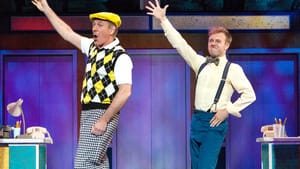Stay in the Loop
BSR publishes on a weekly schedule, with an email newsletter every Wednesday and Thursday morning. There’s no paywall, and subscribing is always free.
Celebrating hypocrisy
'How to Succeed in Business' at the Walnut Street Theatre

While Frank Loesser has achieved full recognition as one of America’s greatest songwriters, not enough credit has been given to his versatility. Loesser consciously made each of his Broadway shows different from the others.
Where’s Charley? was an Oscar Wilde-ish 19th-century English society farce, Guys and Dolls a street-smart view of Broadway nightlife, and The Most Happy Fella a virtual opera about an Italian immigrant in California wine country. Then came How To Succeed in Business Without Really Trying, which was a primer on, well, you know what. The songs in each of these were tailored to the stylistic needs of the musical.
In addition, Loesser accepted the challenge of working on material utterly lacking in plot — Shepherd Mead's satire of the how-to manuals so popular among corporate interns in the 1950s. He adapted the book subtitled "The Dastard's Guide to Fame and Fortune" in partnership with humorist Abe Burrows, who led the scriptwriters and also directed.
The musical, starring Robert Morse, ran from 1961 to 1966 and was revived with Matthew Broderick in 1995 and with Daniel Radcliffe in 2011. The show celebrates the hypocrisy and backstabbing in corporate America and is a delicious satire on the office life of its era, when big business was held in awe by average citizens.
The Walnut has a good reputation for reviving Broadway classics in accord with their original concept rather than trying to reinvent the wheel. This production is one of their best, recapturing the sass I remember from the original production’s tryout here in Philadelphia. During that run, by the way, the original choreographer was sacked, and 34-year-old Bob Fosse was brought in to restage the musical numbers.
Honoring the original
The Walnut’s leading man, Jeremy Morse, is practically a clone of the original, Robert Morse (no relation). He has the same eager-beaver personality, the same boyish grin, and much of the same vocal quality. Morse has sufficient adorable attributes to make us forget that his character, J. Pierrepont Finch, is an insincere manipulator as he progresses from window washer to mailroom clerk to chairman of the board of the World Wide Wicket Company.
The performer who shared top billing in 1961 was Rudy Vallee, who seemed wan in the role of company president J. B. Biggley but who was there to attract older ticket-buyers. Mark Jacoby here is much more vigorous. This veteran leading man (Show Boat, Ragtime) has a much better voice than Vallee and gives the character enough substance to make a strong foil for Finch.
Brian Shepard as Bud Frump, the president’s nephew, uses that connection to oppose Finch’s rise. Shepard is a worthy successor to the originator of the role, Charles Nelson Reilly, and admirably adds fluid body language and clever dance moves. Ed Romanoff reveals a surprisingly big voice in two roles, including the lead vocal in “The Company Way.” Amy Bodnar shows street smarts as the dumb blonde mistress of Biggley.
Not everyone here is that good. Becky Gulsvig is abrasive as Rosemary, the secretary who falls in love with Finch. Her brassy voice would be appropriate in a best-friend comic role but is all wrong for this ingénue. Her costuming, too, was a miscalculation. Dressing Rosemary and the other secretaries as copies of Mary Tyler Moore's Mary Richards missed the point. MTM didn’t go on the air until a decade later as an independent career woman who sought recognition and respect, while Rosemary was a conformist woman in 1961 who just wanted to bask in a man’s approval and raise his babies.
Helping this entertaining production is the choreography by Michele Lynch: quirky in “Coffee Break” and exuberant in “The Brotherhood of Man.” Finch singing to his own reflection in a mirror during “I Believe in You” is a show-stopping high spot.
For another review, by Henrik Eger, click here.
What, When, Where
How To Succeed in Business Without Really Trying. Music and lyrics by Frank Loesser. Book by Abe Burrows, Jack Weinstock, and Willie Gilbert. Casey Hushion directed. Through July 13, 2014, at the Walnut Street Theatre, 825 Walnut Street, Philadelphia. 215-574-3550 or www.walnutstreettheatre.org.
Sign up for our newsletter
All of the week's new articles, all in one place. Sign up for the free weekly BSR newsletters, and don't miss a conversation.

 Steve Cohen
Steve Cohen